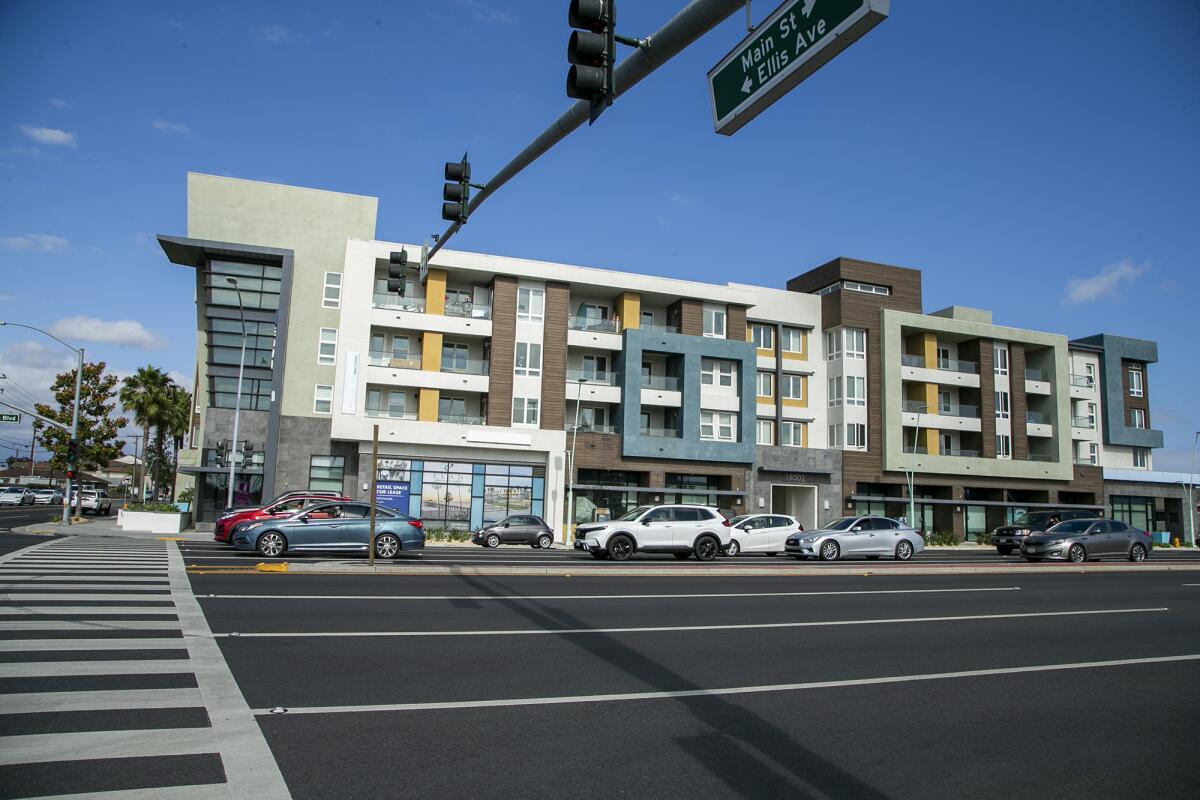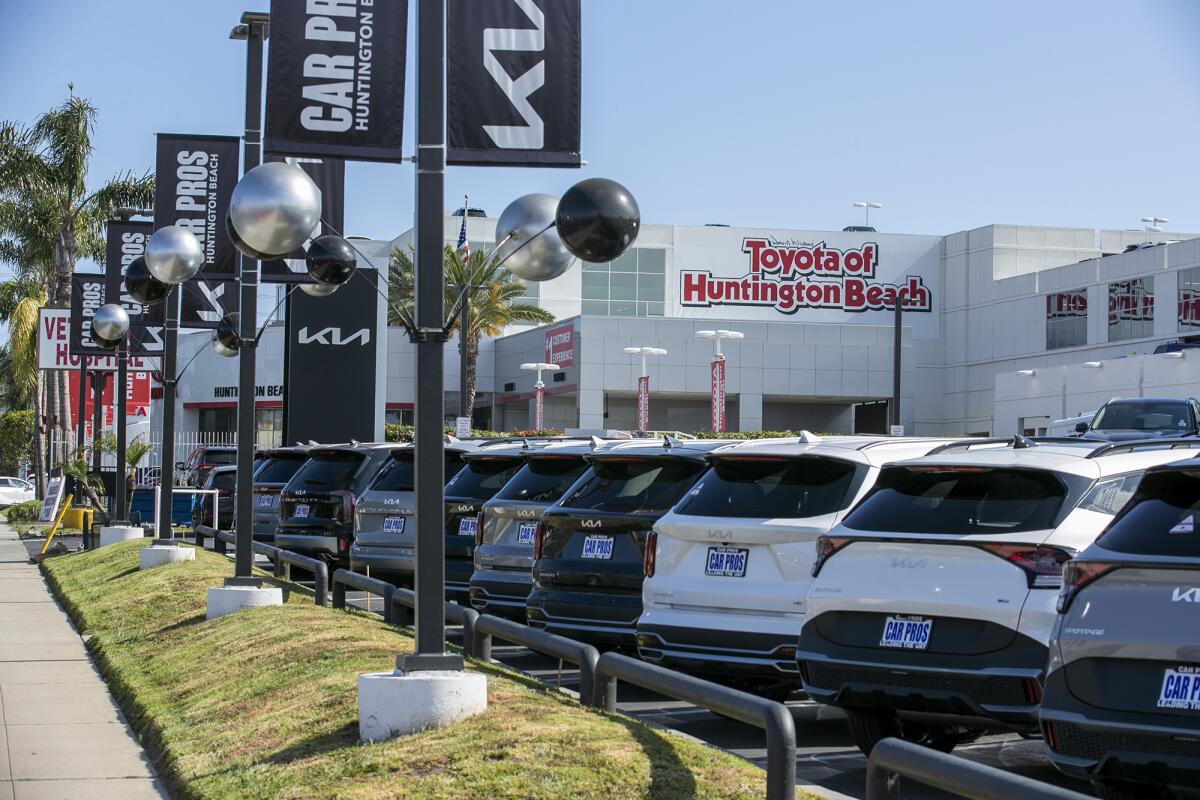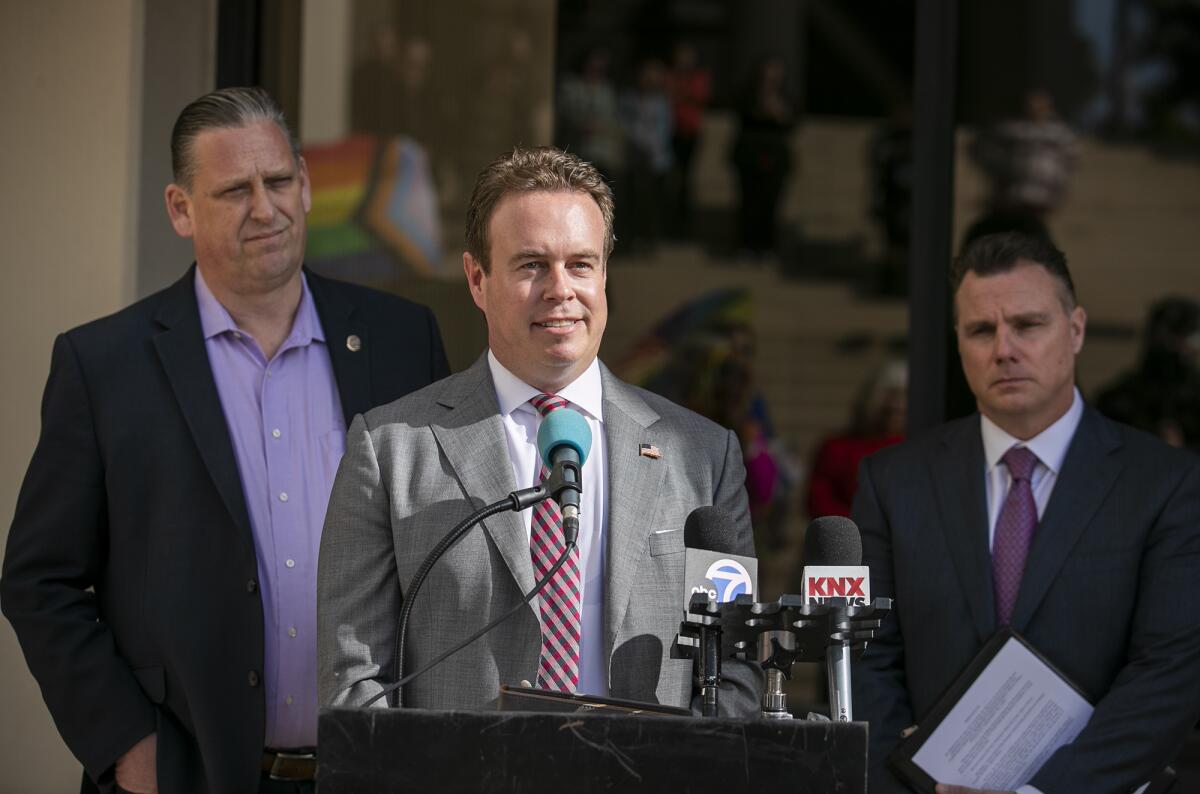Huntington Beach to consider decertifiying Beach and Edinger Corridors Specific Plan report

- Share via
Huntington Beach will review a 13-year-old plan that guides construction on one of the county’s busiest streets.
Councilman Casey McKeon proposed the unusual move Tuesday to decertify the environmental impact report for the Beach and Edinger Corridors Specific Plan.
City staff will study McKeon’s proposal after his agenda item passed by a 4-3 vote along familiar party lines. Mayor Tony Strickland, Mayor Pro Tem Gracey Van Der Mark and Councilman Pat Burns joined McKeon in his vote in favor of studying the EIR’s decertification, with their council colleagues Dan Kalmick, Rhonda Bolton and Natalie Moser voting against the action.
The Beach and Edinger Corridors Specific Plan, adopted in March 2010, largely affects the area of Edinger Avenue between Goldenwest Street and Beach Boulevard, then running south on Beach for a total of 459 acres. Its EIR does a basic review of the impacts that development would have in those areas.
McKeon said the EIR is outdated, as his Democrat counterparts on the dais all asked him the goal of decertifying it.
“It’s been 13 years since this EIR was drafted,” McKeon said. “It’s stale, and we shouldn’t be relying on it. It’s obsolete because the state has passed all these new housing laws that were not contemplated in the existing EIR from 2010. The landscape has totally changed, and the state has turned everything on its head ... The 2010 EIR does not take into account increased public safety needs, infrastructure needs, our finite resources, etc.”
Kalmick, especially, pushed back on the item.

“There’s no mechanism to decertify an established EIR,” he said. “I’ve talked to a bunch of land-use attorneys, and there’s nothing in [the California Environmental Quality Act] that creates that mechanism. So sure, we’ll let staff go and figure that out.”
He continued that the majority of projects built on Beach Boulevard in the last six years have been commercial projects.
“By repealing this in some mechanism, you’re being anti-business,” Kalmick said. “The daycare my child goes to used that EIR. Any auto dealer that wants to remodel is not going to be able to tier under this EIR.
“If the goal is to not build housing on Beach Boulevard ... say it. Say, ‘We don’t want to build housing on Beach Boulevard,’ and change the zoning to eliminate housing on Beach Boulevard. That allows staff to build public policy around that goal.”
The Huntington Beach Auto Dealers Assn., Orange County Business Council and the Kennedy Commission all sent letters to the council expressing concern about McKeon’s item.
The Kennedy Commission, which has been battling with Huntington Beach for years over its housing efforts and recently won a $3.5-million ruling for attorney fees that the city is appealing, is an Irvine-based nonprofit designed to help facilitate the building of lower-income homes in Orange County.
“If the city moves forward with decertifying the EIR, it will cause greater uncertainty in creating affordable housing opportunities in Huntington Beach,” Kennedy Commission executive director Cesar Covarrubias said in his letter.
Orange County Business Council senior vice president Jennifer Bullard said in an email to the City Council that the OCBC’s primary goal is to support and promote the economic development of Orange County.
“OCBC cautions the City Council against removing important tools in the toolbox for business and economic development to occur in the Beach and Edinger Corridors Specific Plan area,” Bullard said.

McKeon, who works in the commercial real estate business, said this specific plan has been problematic for a long period of time.
“In my business, we build gas stations in California, across the country,” McKeon said. “We’ve never had to do an EIR. We have to go through CEQA and analyze the negative impacts to the environment, but just because you remove the EIR doesn’t mean that every project’s going to have to go through and do an EIR.”
He added that if staff comes back with the recommendation to repeal the entire specific plan, he would be in favor of that, “but this is just an idea.”
“I know you care a lot about the environment, so I would think you would be happy about this,” McKeon said to Kalmick.
“How much housing has been built on Beach Boulevard in the last eight years?” Kalmick responded. “None. It’s anti-business. We are for business in this community. One of your tenets is to roll out the red carpet for business, and this makes it harder to do that ... This isn’t a serious policy goal, and you guys aren’t serious people.”
Ursula Luna-Reynosa, the city’s community development director, did not necessarily agree with the characterization of the EIR as “obsolete” or “stale” during Tuesday’s meeting.
“The reality is, only 1,900 units have been either constructed or permitted,” she said. “There’s still significant room in the existing EIR.”
She added that a number of commercial projects in the last several years have tiered off the existing EIR. There has been just one residential project approved under the specific plan in that time, the Ellis Avenue condominiums, which was previously rejected by both the Planning Commission and City Council before being approved last year.
All the latest on Orange County from Orange County.
Get our free TimesOC newsletter.
You may occasionally receive promotional content from the Daily Pilot.




